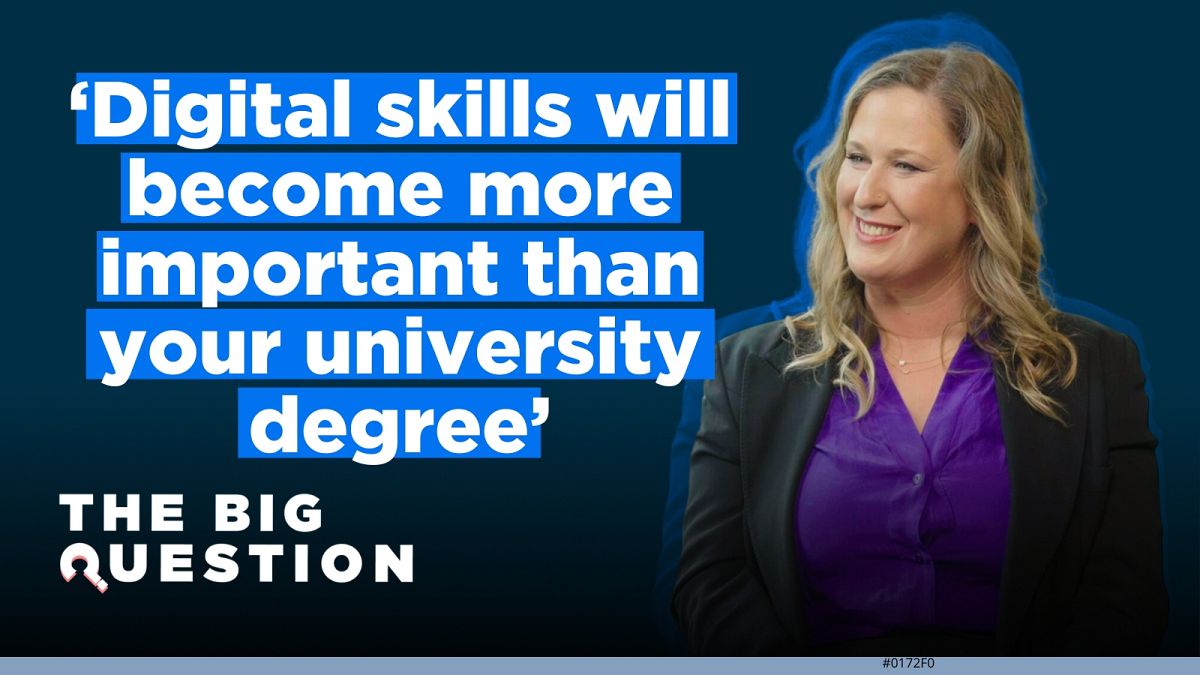Bussiness
AI adoption could boost European business but what’s holding us back?

“Digital skills will actually become more important going forward in the workplace than your actual university degree,” says AWS.
According to a recent report by Strand Partners, the increased adoption of AI by European businesses could add €600 billion to the European economy by 2030.
But how realistic is this and what are the barriers standing in our way?
In this episode of The Big Question, Hannah Brown sits down with Sasha Rubel, Head of AI and Machine Learning at Amazon Web Services (AWS) to discuss how Europe can unlock this economic boost.
How can AI grow the European economy?
According to the report, commissioned by AWS, there are three key issues which are hindering the adoption of AI. If we can overcome these, Sasha said she was “very optimistic that we will reach or even surpass that target”.
1. Lack of regulatory certainty
Without the assurance that regulation won’t change dramatically in the near future, many companies are tentative in their approach to AI. Companies that were concerned about the lack of regulatory certainty plan to invest up to 48% less over a three-year period in artificial intelligence.
2. Lack of digital skills
We already know that young people are tech savvy and good at learning new skills. However, Sasha stressed the importance of not just training young people but ensuring those already in the workforce are upskilled so that they can work alongside, rather than be replaced by, AI.
“What we’re seeing now is that digital skills will actually become more important going forward in the workplace than your actual university degree,” Sasha added.
3. Lack of democratisation
There’s a big gap between the AI adoption of large businesses and SMEs. Bigger companies are adopting AI at a rate of 51% whereas smaller companies are only around 31%.
Sasha suggested the cloud plays a really important role in reducing that disparity.
“Not only does the cloud reduce the carbon footprint of innovation up to 80%, but in fact, when AWS is powered 100% by renewable energy, which we aim to reach by 2025, so five years in advance [of the 2030 goal], it will be up to 96% more efficient. And this means that people can innovate responsibly and they can also innovate sustainably.”
What are the business benefits of AI adoption?
All these statistics are all well and good, but you might still be wondering, how AI can actually inject €600bn into Europe’s economy?
In short, increased productivity.
Many repetitive tasks can be automated, giving employees more time for creative tasks. It’s also a great tool for transforming raw data into insights in minutes rather than months.
“I’ll give you another example: In the past when we used to do software updates, it used to take us more than 100 engineers and more than a month. Now we’ve automated that and we can do it in six minutes,” Sasha explains.
The benefits aren’t only for the tech industry or businesses you’d naturally associate with using AI. Sasha was enthusiastic about AI’s potential across all industries including agriculture and health.
“AI wouldn’t necessarily be intuitive into their actual business processes [but can] help them deliver more value, be more productive, and help them in reality, to address some of the biggest challenges of our world today, like things like climate change or access to education, among others.”
How to equip the workforce with AI skills
More than 60% of the companies surveyed said their employees lacked digital skills and that was inhibiting their AI adoption.
“But when we talked to employees, employees said: Look, we would love to learn new skills, but we don’t have the time. And the cost of these classes are, above all, prohibitive,’” Sasha explained.
“We also see a general kind of effervescence of citizens across the EU that are really excited about how AI will change their lives over the next five years. More than half of EU citizens believe that AI will have a positive impact in the ways in which they work and live.”
At the end of 2024, AWS launched their AI ready commitment to train more than two million people by 2025 in AI and Machine Learning. Alongside their machine learning university, they made more than 80 classes available for free online.
The classes not only cover technical skills but issues such as bias, fairness and responsibility.
“It’s a great opportunity for us to build better technology for a better world, but it’s also a great opportunity for us to make ourselves better so that we are actually developing technology that is targeting the communities as diverse as the individuals that should be building it,” Sasha stressed.
The Big Questionis a series from Euronews Business where we sit down with industry leaders and experts to discuss some of the most important topics on today’s agenda.
Watch the video above to see the full interview with Sasha Rubel.
Video editor • Joanna Adhem
Additional sources • Additional editing from Nicolas Coquet










